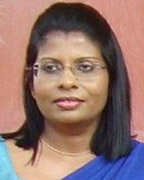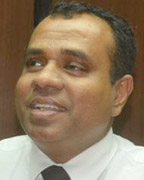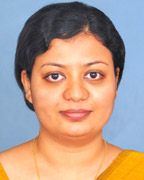|
Human genetic studies program at Colombo Medical
College:
A ray of hope to improve quality of life
By Dhaneshi Yatawara
Genes decide who we are and to an extent how healthy our lives are
going to be. Our physique, characteristics, talents, skin colour and
many more as well are based on genes. Among these categories,
genetically transmitted diseases pose a great risk for the human life.
Many genetics disease do not have a definitive cure, as we all know. But
that alone does not mean it is the end of life.
Genetics clinic
Many genetic diseases or disorders can be stopped from passing to the
next generation by taking the right decision at the right time. Even the
most painful neurodegenerative disease such as Spinocerebellar ataxia (SCA)
that would bring an early end to a person's life, has a ray of hope to
improve the quality of life.
"There are number of ways that can support a patient suffering from
unavoidable genetic diseases and it's very unfortunate that some
families think that having a family member with a genetical disorder or
a disease is the end of their world when something can be done to bring
relief in such a situation," said Professor in Anatomy and Medical
Genetics of the Colombo University Prof. Vajira Dissanayake.
According to Prof. Dissanayake in the Sri Lankan population one in
ten have rare disorders and although individually rare when taken as a
group it counts up to a significant number. Genetic disorders can create
a whole package of problems socially, economically for an affected
family. In order to address many of these situations to a greater
possible extent, the Human Genetics Unit of the Medical Faculty of the
University of Colombo have started a Clinic dedicated to people Genetic
disorders and family histories.
The clinic has been officially functioning since 1983 established
under the leadership of Prof Rohan Jayasekara. Since last year the Human
Genetics Unit has been trying to revamp the clinic and today it
functions all five days with more staff and attending to genetic
problems under five different categories.
 |
 |
 |
| Dr. Nirmala
Sirisena |
Prof. Vajira
Dissanayake |
Dr. Dulika Sumathipala |
Though disorders such as SCA strike a person later in their lives
some conditions start showing symptoms from infancy. And some cases
result in infant deaths. According to Prof. Dissanayake addressing
problems related to Genetic disorders becomes crucial as birth defects
count up to 20 percent of the total infant deaths in Sri Lanka. Today in
Sri Lanka the infant mortality rate is 9 in to 10,000 births.
"Birth defects are there in any population. But usually what happens
is because there are common diseases such as infectious diseases,
diarrhoea, respiratory diseases and so on, where people do not pay much
attention to birth defects. And the other reason is that a family having
a person with birth defects tend to hide that person and seek treatment
individually," said Prof. Dissanayake explaining true situation
prevailing in the country.
"If our country needs to improve the infant mortality rate we need to
start looking at minimising birth defects in infants. If we can reduce
these birth defects then our infant mortality rates will come down
further making our health indices much better," he said.
As Prof. Dissanayake said, the general feeling is that nothing can be
done for birth defects. "But there is a lot that can be done and we have
to take appropriate steps for make the condition better. One can see
medical attention, seek solution through counselling and so many other
options to help in these situations," he said.
Most common birth defect seen in Sri Lanka would be Down's Syndrome
and another example would be Turner's Syndrome. Warning signs would be
instances such as families who had children with birth defects, couples
experiencing sub fertility, repeated miscarriages. And in some cases a
newly born infant dies without a known reason. In other cases children
who are born grow up with various problems. They do not look normal,
they have problems in learning and growing - these are some of the
warning signs of birth defects that may occur in the next child. "Most
of these cases have no proper diagnosis either. They go on using terms
such as development delays etc. And then people live with it," said
Prof. Dissanayake.
Public awareness
"Actual situation is that those parents can be supported to have a
another normal child. Sometimes parents come to us 10 - 12 years after
the first child but by then parents are old and in a risky age to
conceive," he said. Families with such risk factors need to go in for
further investigations and referred to correct medical advice, he said.
Slowly but steadily we see an increase in awareness among the public,
said Dr. Nirmala Sirisena Clinical Geneticist and Lecturer at the Human
Genetics Unit. Geneticists could see an increase in the number of
patients coming for consultations.
Dr. Nirmala Sirisena is one of the Clinical Geneticist working in the
Genetics Clinic and is in charge of the Thursday clinic dedicated mainly
to cancer patients and persons with a family history of some sort of a
cancer. Among her patients a young woman came in with a family history
of breast cancer. "Her mother was undergoing treatment for breast cancer
and her grand mother have had breast cancer as well. So the daughter
came to the clinic to see what could be done to avoid her having breast
cancer," Dr. Nirmala started explaining.
"There was a high possibility for this woman to develop breast cancer
with records from two generations and we carried out several tests on
her," she said. Yet the woman did not have any early signs of breast
cancer at the moment but there were indications she is prone to the
illness. "As a preventive measure she agreed to perform mastectomy - the
breast removing surgery done as a preventative measure. And she did not
develop breast cancer like her mother and grandmother," Dr. Nirmala
said.
Another horrific case was discovered by the Genetics clinic existing
in three small villages deep down in the Southern Province. Through a
Colombo university student few patients visited the Genetics clinic and
were referred to the two professors of the Human Genetics Unit -
Professors Rohan Jayasekara and Vajira Dissanayake.
Mysterious disorder
The disorder was identified as a rare nurodegenerative disorder named
Spinocerebellar ataxia or in short SCA. This is a hereditary disorder
that result in degeneration of the nerve cells in the Cerebellum which
is mainly responsible for keeping our balance. Though SCA is genetically
transmitted, symptoms of the disease strike in adulthood.
According to the research these villagers have experienced the onset
of the disorder between the ages of 20 - 30. "Many of the patients I
examined at the clinic were around 30 - 40 years and symptoms were
according to the typical clinical picture. From the patients themselves
I got to know that there is a whole lot of cluster back in their
villages who have not had been to medical practitioners at all. Mainly
because they knew that it was incurable," said Dr. Dulika Sumathipala,
Clinical Geneticist and lecturer in the Human Genetics Unit. Though SCA
is genetically transmitted, symptoms of the disease strike in adulthood.
The trip to these three villages following the information lead the
path towards a unique research in the Sri Lankan medical field. Doctor
Sumathipala is a member of the team that did this research on these
villagers' mysterious disorder. Through the research it was confirmed
that this is Spinocerebellar Ataxias (SCA), the genetically acquired
disorder.
The research team from the Colombo University Genetics Unit comprised
of Professors Vajira Dissanayake and Rohan Jayasekara and doctors Dulika
Sumathipala, Gayan Abeysekara and Chantal Tallaksan from University of
Oslo.
Speaking on behalf of her team Dr. Dulika said that they were able to
examine nearly 35 persons from all walks of life who were partly
paralysed or completely bed ridden. "Over generations these people have
been goldsmiths and they were saying that the heavy metals and chemicals
may have poisoned them," she explained about the misconception that
these people blindly believed.
One litre of tears
In a world famous book 'one litre of tears' written by a Japanese
girl named Aya Kito who suffered SCA made the world realise the true
suffering of these patients. Aya suffered for nearly ten years and died
at the age of 25. Fortunately she had the accessibility to all the other
supportive measures extended to these patients. Yet not for the people
of the three Sri Lankan villages.
The mysterious disease has been horrifying these three villages over
six to seven generations. They believed it was a curse on the family
line and had never been to a medical practitioner. Earlier generations
must have gone to medical practitioners and probably they have got to
know that the disease has no cure.
And the next generation paid less interest to go for medical
treatment," said Dr. Dulika Sumathipala. "Other sad part is that the if
either of the parents carry these genes the child has a 50% chance of
getting the disorder. And many of these families keep these patients in
a very remote room of the house. The patients tend to develop a
respiratory tract infection and die," she said.
To keep this disorder as a secret, people living in these clusters
were marrying members of their own extended family - blood relatives.
When that happens the disease continue to transmit from generation to
generation, she said. The social stigma these people carried added
misery to the unending suffering of these people.
According to Dr. Sumathipala these people were not aware of the
options that were available and would have supported them to get out of
the this neuro degenerative disorder. They have been totally unaware of
the fact that the use of physiotherapy could have improve the living
conditions of the affected people.
They were not aware of reproductive options modern sciences offer
such as In vitro fertilisation (IVF) with donor eggs and sperms could
stop the disorder being passed on to the next generation. "Though such
neurodegenerative disorders do not have a cure there are numerous
options like physio therapies, speech therapies that would support the
patient," she said.
In many genetical disorders this is the true situation prevailing in
Sri Lanka. This is where the Human Genetics Unit of the Colombo Medical
College were able to intervene and educate these people using the
facilities of their Genetics clinic. |

